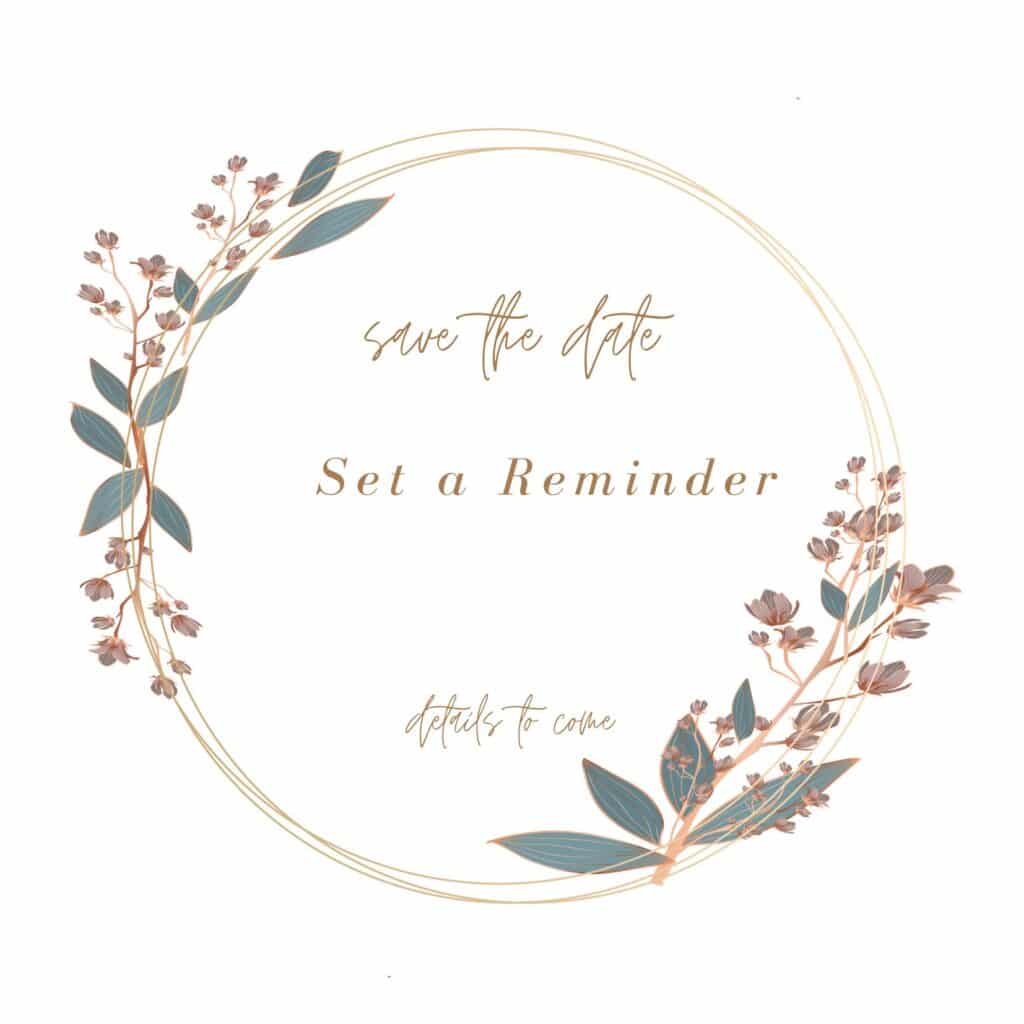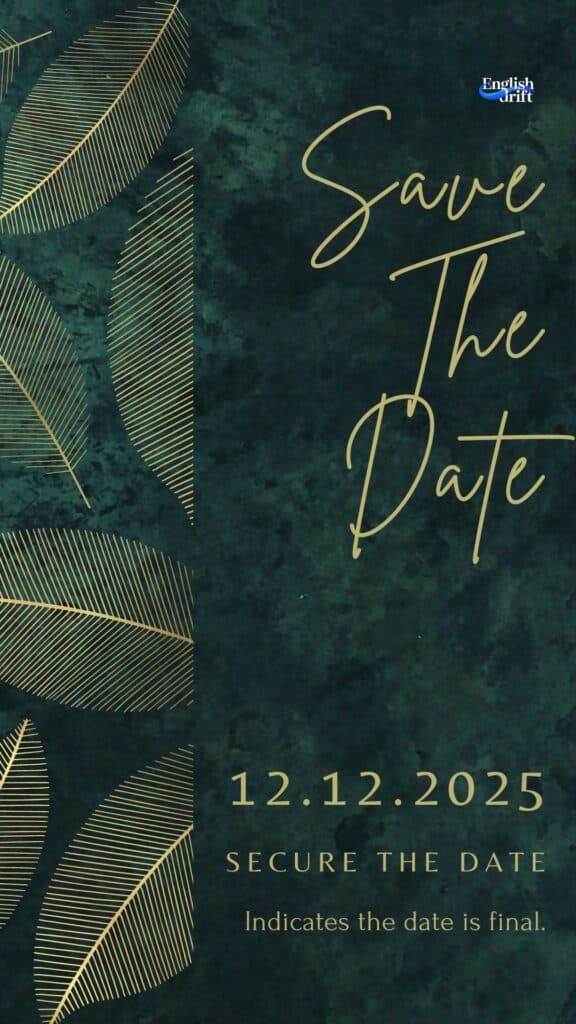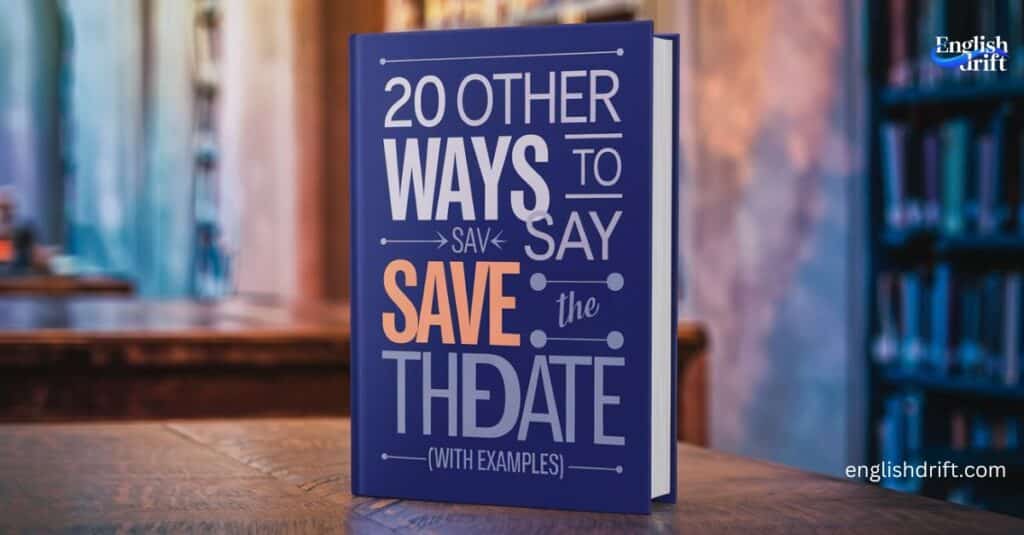When planning an event, ensuring your guests remember the date is crucial. The traditional phrase “Save the Date” is common, but it’s often useful to have a variety of expressions to suit different tones and contexts. so we will discuss 20 Other Ways to Say “Save the Date” (With Examples)
Whether you’re organizing a formal wedding or a casual get-together, using alternative phrases can add a personal touch and better fit the formality of your event.
In this guide, we’ll explore 20 alternative ways to say “Save the Date”, offering practical examples and insights for each phrase.
Understanding the Context
When to Use “Save the Date”: This phrase is typically used in advance of an event to inform guests of the date, so they can keep it free. It’s particularly common for weddings, large parties, and significant events where planning ahead is essential.
Why Alternatives Are Valuable: Using varied expressions helps tailor the message to the specific audience and event. While “Save the Date” is versatile, alternatives can better match the formality, tone, and urgency of your message
Read More 20 Other Ways to Say “Happy Birthday in Advance” (with Examples)
Here are 20 alternative ways to say “Save the Date”:
- Mark Your Calendars
- Reserve the Date
- Don’t Make Other Plans
- Put It on Your Schedule
- Circle the Date
- Lock It In
- Clear Your Calendar
- Block Off the Day
- Set a Reminder
- Make a Note of It
- Hold the Date
- Confirm the Date
- Secure the Date
- Set Aside the Date
- Finalize the Date
- Confirm the Event
- Agree on the Date
- Keep the Date Open
- Prioritize the Date
- Note the Event
You might like this 20 Other Ways to Say “Have a Great Weekend” (With Examples)
Detailed Descriptions of save the date examples
1. Mark Your Calendars
Tone: Friendly and informal
Example: “Hey everyone! Mark your calendars for our annual summer BBQ on July 15th. Can’t wait to see you all there!”
Why It Works: This phrase is warm and approachable, making it perfect for casual gatherings. It encourages guests to note the event in their calendars without sounding overly formal.
Similar Phrases:
- Mark the Date: Use this to emphasize the importance of remembering the date.
- Calendar Your Event: A slightly more formal option.
- Remember the Date: Direct and clear.
- Set the Date: Implies a firm plan.
- Note the Date: Simple and straightforward.
2. Reserve the Date
Tone: Formal and commitment-oriented
Example: “We are delighted to invite you to our wedding on October 5th. Please reserve the date and join us for our special day.”
Why It Works: This phrase conveys a sense of formality and importance, suitable for significant events like weddings or official ceremonies.
Similar Phrases:
- Hold the Date: Indicates a request for guests to keep the date available.
- Confirm the Date: Implies a confirmation of a previously discussed date.
- Secure the Date: Ensures the date is set aside specifically for the event.
- Lock the Date: Strongly suggests that the date is fixed.
- Set Aside the Date: Emphasizes making space in one’s schedule.

3. Don’t Make Other Plans
Tone: Direct and emphatic
Example: “Mark your calendar for March 22nd and don’t make other plans. We’re hosting a crucial team meeting that day.”
Why It Works: This phrase is assertive, making it ideal for important events where you need to ensure full attendance.
Similar Phrases:
- Prioritize the Event: Emphasizes the importance of the event over others.
- Keep the Day Clear: Ensures that guests do not have overlapping commitments.
- Avoid Scheduling Conflicts: Useful for avoiding double-bookings.
- Commit to the Event: Strongly encourages attendance.
- Ensure Availability: Highlights the necessity of being free for the event.
4. Put It on Your Schedule
Tone: Organized and professional
Example: “Please put it on your schedule for the upcoming annual conference on April 12th. We look forward to your participation.”
Why It Works: This phrase is straightforward and professional, making it appropriate for business events or formal gatherings.
Similar Phrases:
- Add to Your Calendar: Suggests adding the event to a digital calendar.
- Schedule the Event: Indicates that the event should be included in their timetable.
- Place on Your Planner: Useful for traditional paper planners.
- Organize Your Schedule: Encourages guests to adjust their plans accordingly.
- Slot It Into Your Timetable: Suggests integrating the event into an existing schedule.
5. Circle the Date
Tone: Casual and inviting
Example: “Don’t forget to circle the date for our weekend getaway on August 20th. It’s going to be a blast!”
Why It Works: The light-hearted and engaging tone of this phrase makes it perfect for informal events and friendly invitations.
Similar Phrases:
- Highlight the Date: Draw attention to the date in a calendar.
- Note the Event: Simple and casual.
- Mark the Occasion: Emphasizes the significance of the event.
- Pinpoint the Date: A precise way to indicate the date.
- Emphasize the Date: Highlights the importance of the event date.
6. Lock It In
Tone: Confident and assured
Example: “Let’s lock it in for November 10th. We’re excited to announce our new product launch!”
Why It Works: This phrase conveys certainty and finality, making it ideal for significant announcements and important dates.
Similar Phrases:
- Finalize the Date: Suggests that the date is now set.
- Confirm the Event: Reassures that the event details are settled.
- Secure the Day: Ensures that the day is reserved.
- Agree on the Date: Indicates mutual agreement on the timing.
- Ensure the Date: Highlights the importance of the confirmed date.

7. Clear Your Calendar
Tone: Urgent and important
Example: “Please clear your calendar for December 1st. We have a mandatory training session that day.”
Why It Works: The straightforward and urgent nature of this phrase ensures that the date is kept open without ambiguity.
Similar Phrases:
- Make Time Available: Ensures that guests prioritize the event.
- Free Up Your Schedule: Encourages guests to adjust their plans.
- Keep the Date Open: Simple and direct.
- Keep Your Calendar Clear: Emphasizes the need for availability.
- Prioritize the Date: Suggests the date should be given top priority.
8. Block Off the Day
Tone: Comprehensive and thorough
Example: “Block off the day on September 14th for our annual charity gala. We’re looking forward to celebrating with you!”
Why It Works: This phrase is detailed and ensures that guests allocate the entire day for the event.
Similar Phrases:
- Reserve the Day: Ensures the entire day is set aside.
- Set Aside the Day: Emphasizes keeping the whole day free.
- Keep the Day Free: Ensures no other commitments are made.
- Allocate the Day: Suggests a full day dedication.
- Mark the Day: Highlights the importance of the entire day.

9. Set a Reminder
Tone: Practical and tech-savvy
Example: “Set a reminder for June 5th so you don’t miss our annual product showcase. We hope to see you there!”
Why It Works: This phrase is practical and fits well with modern, tech-savvy audiences who use digital reminders.
Similar Phrases:
- Schedule a Reminder: Indicates using a digital tool to remember the date.
- Set an Alert: Suggests a notification setup.
- Note Down a Reminder: Simple and clear.
- Create a Notification: Useful for digital calendars.
- Set Up a Prompt: Encourages using technology to remember the event.
10. Make a Note of It
Tone: Attentive and considerate
Example: “Make a note of it for our team-building retreat on February 22nd. Your participation will make a difference!”
Why It Works: This phrase is gentle and considerate, making it ideal for both formal and informal events.
Similar Phrases:
- Jot It Down: Casual and straightforward.
- Remember the Date: Direct and clear.
- Write It Down: Encourages noting the event.
- Note It: Simple and effective.
- Keep It in Mind: Reminds guests of the event.
11. Hold the Date
Tone: Formal and reserved
Example: “We request you to hold the date of March 15th for our business conference. More details will follow.”
Why It Works: This phrase is formal and polite, suitable for professional or significant events.
Similar Phrases:
- Reserve the Date: Commonly used for formal events.
- Set Aside the Date: Emphasizes keeping the date free.
- Confirm the Date: Implies acknowledgment of the date.
- Secure the Date: Ensures the date is reserved.
- Lock the Date: Suggests finality.
12. Confirm the Date
Tone: Professional and official
Example: “Please confirm the date of our annual review meeting on April 20th. Your presence is required.”
Why It Works: This phrase is professional and emphasizes the importance of confirming attendance for formal events.
Similar Phrases:
- Verify the Date: Ensures the date is acknowledged.
- Affirm the Date: Indicates a confirmation of the date.
- Validate the Date: Suggests checking and confirming.
- Finalize the Date: Ensures the date is set.
- Establish the Date: Implies setting the date firmly.
13. Secure the Date
Tone: Confident and definitive
Example: “Secure the date of July 9th for our gala dinner. We look forward to your attendance.”
Why It Works: This phrase confirms that the date is firmly set, making it suitable for high-priority events.
Similar Phrases:
- Confirm the Date: Ensures the date is agreed upon.
- Lock the Date: Indicates the date is final.
- Set Aside the Date: Emphasizes reservation.
- Reserve the Date: Commonly used for formal occasions.
- Hold the Date: Suggests keeping the date available.

14. Set Aside the Date
Tone: Practical and considerate
Example: “Set aside the date of September 5th for our community fundraiser.
Why It Works: This phrase is practical and suggests that guests should make arrangements to keep the date free.
Similar Phrases:
- Reserve the Date: Ensures the date is kept available.
- Hold the Date: Similar emphasis on reservation.
- Secure the Date: Indicates a firm reservation.
- Mark the Date: Highlights the importance of the date.
- Confirm the Date: Implies acknowledgment.
15. Finalize the Date
Tone: Authoritative and conclusive
Example: “Let’s finalize the date for our annual seminar on May 25th. Looking forward to a productive day!”
Why It Works: This phrase is authoritative, suggesting that the date is now set and confirmed.
Similar Phrases:
- Set the Date: Indicates the date is established.
- Confirm the Date: Ensures acknowledgment.
- Lock the Date: Implies a firm date.
- Secure the Date: Highlights finalization.
- Agree on the Date: Ensures mutual agreement.
16. Confirm the Event
Tone: Professional and clear
Example: “We would like to confirm the event scheduled for April 30th. Please keep this date available.”
Why It Works: This phrase is clear and professional, making it ideal for formal communications.
Similar Phrases:
- Verify the Event: It ensures the event is acknowledged.
- Affirm the Event: Indicates confirmation.
- Validate the Event: Suggests verification.
- Finalize the Event: It ensures the event is set.
- Establish the Event: Implies firm scheduling.
17. Agree on the Date
Tone: Collaborative and communicative
Example: “Let’s agree on the date for our team outing. How does June 18th work for everyone?”
Why It Works: The collaborative nature of this phrase makes it suitable for meetings or discussions where mutual agreement is needed.
Similar Phrases:
- Set the Date: Indicates firm scheduling.
- Confirm the Date: Ensures acknowledgment.
- Finalize the Date: Suggests completion.
- Secure the Date: It ensures the date is set
- Lock the Date: Highlights finality.
READ MORE
20 Other Ways to Say “Rest in Peace” (With Examples)
18. Keep the Date Open
Tone: Casual and flexible
Example: “Please keep the date open for our surprise party on October 2nd. Details to follow!”
Why It Works: The casual and flexible nature of this phrase makes it ideal for informal events where exact plans are still being finalized
Similar Phrases:
- Clear Your Calendar: Ensures availability.
- Make Time Available: Encourages prioritization.
- Free Up Your Schedule: Suggests adjusting plans.
- Prioritize the Date: Emphasizes importance.
- Keep Your Calendar Clear: Direct and clear.
19. Prioritize the Date
Tone: Emphatic and assertive
Example: “Make sure to prioritize the date of our annual retreat on November 3rd. It’s going to be a key event!”
Why It Works: This phrase emphasizes the importance of the date, ensuring guests understand the event’s significance.
Similar Phrases:
- Keep the Day Clear: Ensures no other commitments.
- Avoid Scheduling Conflicts: Prevents double-bookings.
- Commit to the Event: Strongly encourages attendance.
- Ensure Availability: Highlights the need to be free.
- Make Time Available: Suggests adjusting schedules.
20. Note the Event
Tone: Simple and unobtrusive
Example: “Please note the event on July 22nd for our company’s annual picnic. Hope to see you there!”
Why It Works: This phrase is straightforward and unobtrusive, making it suitable for casual or informal notifications.
Similar Phrases:
- Make a Note of It: Simple and effective.
- Jot It Down: Casual and quick.
- Remember the Date: Direct and clear.
- Write It Down: Encourages noting the date.
- Keep It in Mind: Reminds guests of the event.
Conclusion
Using a variety of phrases to remind guests of your event can make your invitation stand out and better match the formality or tone of the occasion. From formal “Reserve the Date” to casual “Circle the Date,” each expression serves a unique purpose and helps convey your message effectively. By choosing the right phrase, you ensure your event is top of mind for your guests, making it easier for them to plan and attend.
Feel free to use these alternatives to “Save the Date” in your invitations and communications, and tailor them to fit the style and tone of your event.
READ MORE
20 Other Ways to Say “Happy Valentine’s Day” (With Examples)
20 Other Ways to Say “Have a Good Day” (With Examples)

Henry James is an experienced blogger at English Drift, specializing in English grammar and vocabulary. With a passion for language and clear communication, Henry helps readers enhance their writing skills through insightful guides and practical tips.







